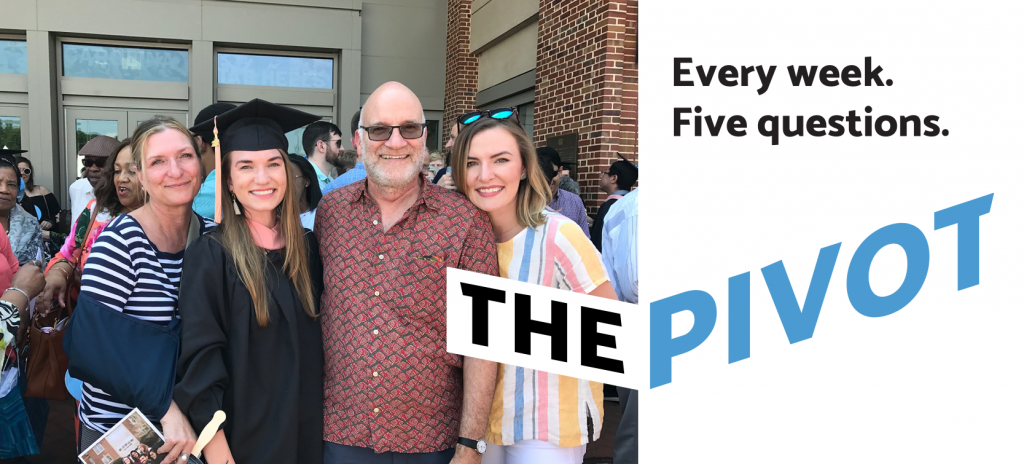
Jenna McCready is helping NYC families weather the pandemic.

What’s your role in public health?
I work with the New York City Department of Health as a breastfeeding initiatives analyst. I manage our hospital collaborative, which offers training on how to support family-centered infant feeding. The goal is for the hospitals to achieve the Baby-Friendly designation.
I’m also an alumna of the Gillings School! I graduated in 2018 with a master’s degree from the maternal and child health department. I developed such important personal and professional relationships with my cohort at Gillings — I think it’s rare to find people who follow the same track as you and are true colleagues and equals, but I found that in Chapel Hill.

Can you describe your focus area in one sentence?
To use a much-loved tagline from our group within the Department of Health: “It’s our job to protect the littlest New Yorkers.”
Personally, though, I would say: “To see families and have families feel seen.”
There’s 100% a health equity component to childbirth, and we’ve been evolving our breastfeeding programs to reflect that. With our most recent cohort of hospitals, we included training on implicit bias and institutional racism. The conversations were hard, and some people got angry, but the process was vital.
We’ve also added cultural humility presentations featuring individuals from many communities — Orthodox Jewish, Chinese and Muslim, to name a few. We dive into questions like, “How can new parents give their baby skin-to-skin time modestly?” and “How can we ensure that Muslim mothers receive care from female doctors only?”
The first step toward truly equitable health care is for us to understand that these differences matter deeply. We want all our patients can get the care they need, which doesn’t look the same from family to family. It’s a hard challenge in a city with millions of people speaking 100+ languages. We know we’re doing the work imperfectly, but we’re committed to this heavy lift and we’re doing the work humbly.

What brought you to public health?
After I finished college, I was living in Philadelphia but got the urge to move to New York. My boss connected me with a colleague there who was doing quality improvement for public health programs. I got a position with her and dove into quality improvement work for programs spanning colonoscopies to reproductive rights — and the topic that stuck out to me was breastfeeding.
As an undergrad, I majored in psychology and my favorite course was developmental psych. I’ve always been drawn to the concept of parenthood and watching young people learn and grow. Making sure people are healthy and supported begins when they’re born, and I realized I wanted to help provide a safety net for new parents and their children at a time when they are most vulnerable.

How have you pivoted in response to the coronavirus pandemic?
When you’re part of the Department of Health, you’re aware that you can be “activated” at any time to help with emergency response. When COVID came to New York, I was activated as part of the Incident Command System, a department-wide structure that oversaw a coordinated response to the virus. I worked in the planning section and the forward planning section, which meant tackling a lot of logistics. At first, I was on every COVID planning call, taking notes on updates and combining them into daily reports. Later, I supported a group that was anticipating future challenges: How can we combat anti-vaccine rhetoric? Should we anticipate a second wave of the virus? What will happen when flu season arrives?
I kept supporting family care, too. Our team lobbied hard to get the executive order from Governor Cuomo that allowed all birthing parents to have one support person with them during labor. Before that, a lot of families were leaving the state to give birth, because there can be real trauma associated with birthing alone.
I also became the co-chair of our perinatal task force, which works to fill gaps in support for birthing parents. We work with a lot of partners, including different Department of Health teams, the public hospital system, community-based groups, and independent practitioners like doulas and midwives in birthing centers. Earlier in the pandemic, some parents were being discharged from the hospital just 24 hours after birth. Our collaboration supported them through virtual visits that provided a safety net via monitoring for any health concerns.
We put out a lot of informational documents on infant feeding during emergencies. We worked with food banks to supply families with essential items like diapers, formula and feminine hygiene products, which were in really short supply at the start of the pandemic. We moved our lactation support groups online and have worked with hospitals to make newborn care and safety classes digital, as well.

Who are you when you’re at home?
I love yoga! I actually completed teacher training, but I just use it to practice. I love to travel and was lucky enough to visit Italy right before COVID hit. I like spending time with family and friends. If you were to find me in my happy place, I’d be on a beach with a good book.
